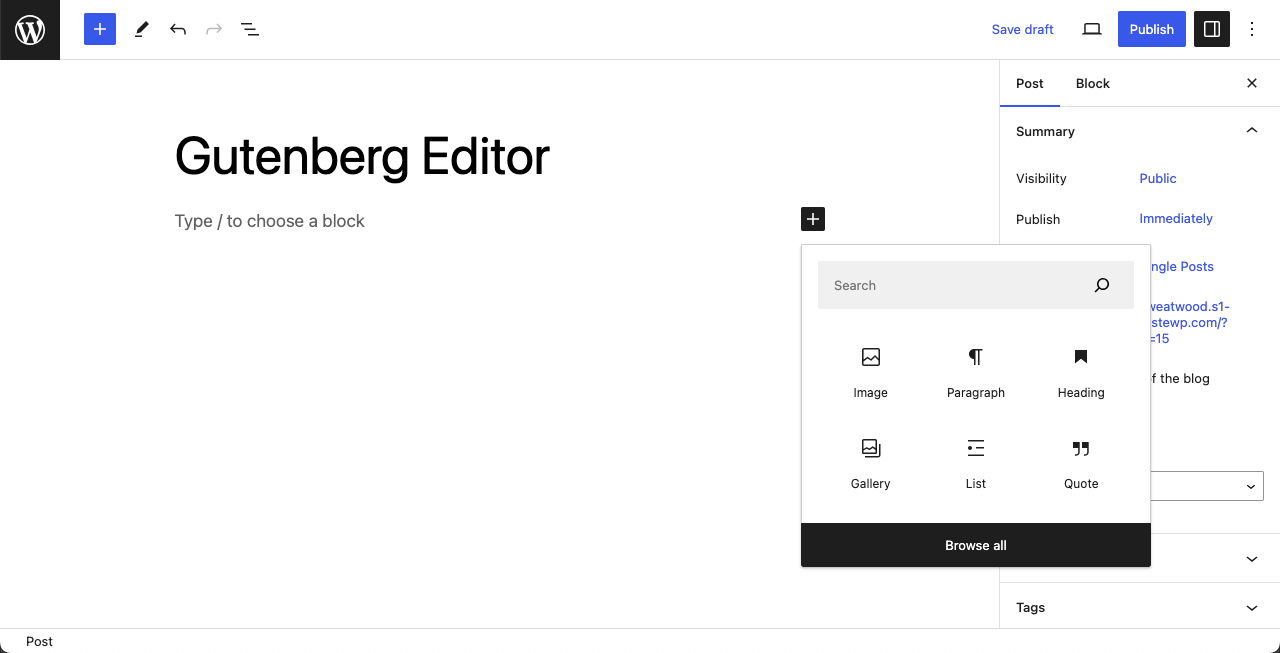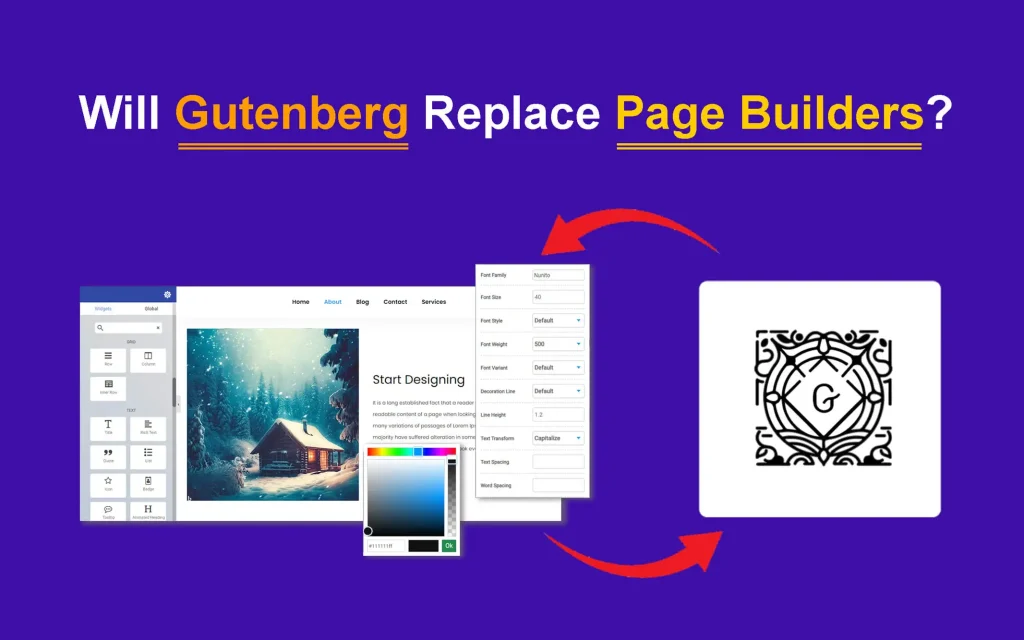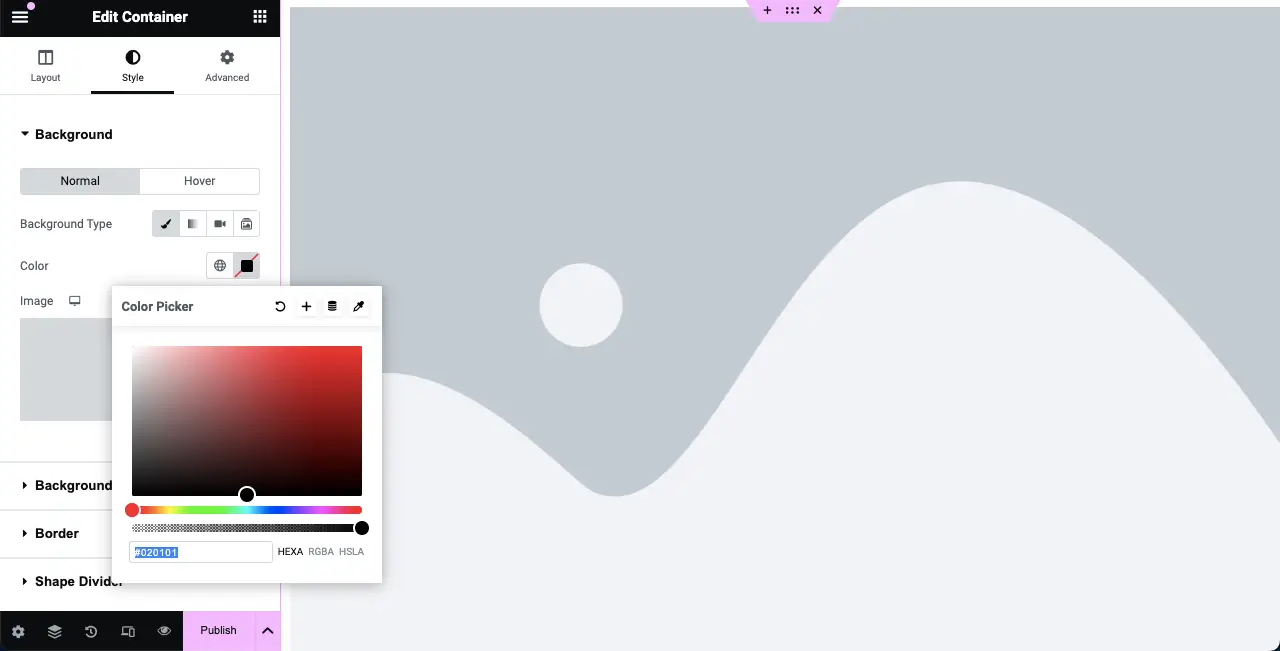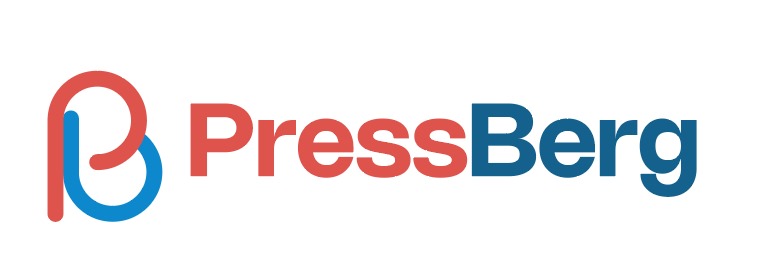The realm of website design and content creation is constantly evolving. They regularly come up with new tools and ideas that reshape the content creation process. For years, Page Builders have served as the only no-code solution for website design and content presentation.
But WordPress introduced a new content editor, Gutenberg, several years ago. This has sparked a debate – will Gutenberg replace traditional Page Builders? This blog post will cover a detailed analysis of this topic and reach a viable conclusion. Get started!
What Is a Page Builder?
A Page Builder is a plugin that facilitates web design and content creation without any coding knowledge. It offers a visual drag-and-drop interface that allows users to construct web pages by adding and arranging various elements.
Page Builders gained popularity in 2012 when Visual Composer and Beaver Builder emerged. Next, in 2013 and 2016, the two most popular Page Builders, Divi and Elementor, were released. Over time, they kept introducing new features and compatibility with third-party tools.
What Is the Gutenberg Editor?
Gutenberg is designed to enhance the content creation experience within the WordPress eco-system. Its development began in 2017 and was first released in December 2018 with WordPress 5.0. It introduced a block-based approach to content creation.
Since its release, Gutenberg has gone through numerous updates and refinements, expanding its capabilities and addressing user feedback. It has become an integral part of the WordPress core, offering users a modern and intuitive way to create and manage their content.

Gutenberg vs Page Builders: Key Differences Between Them
Hope you all have basic ideas about the key features of WordPress Page Builders and the Gutenberg editor. So, I don’t feel the need to talk about them in detail in this article. Rather take a look at the key differences between them in terms of their key features.
Before going to cover who the winner is, the differences between them can make it easier for you to find out which tool is lagging behind the other one. I have presented the key differences between the Gutenberg and Page Builders in the table below.
| Features | Page Builders | Gutenberg Editor |
| Drag and drop interface | Yes | Limited |
| Live Preivew | Yes | Yes |
| Pre-designed templates and customizable layouts | Yes | Limited |
| Responsive design capabilities | Yes | Yes |
| Front-end editing | Yes | No |
| Extensive library of elements and widgets | Yes | Limited |
| Integration with third-party tools and plugins | Yes | Limited |
| Code-free customization and styling options | Yes | Limited |
| Content reusability | Yes | No |
| Undo/redo functionality | Yes | Limited |
| Animation, effects, and collaboration features | Yes | Limited |
| Form builders, lead generation, and SEO options | Yes | No |
| WooCommerce Integration | Yes | No |
| Multilingual Support | Yes | Yes |
| Mobile Optimization | Yes | Yes |
| Export/import functionality for backups | Yes | Yes |
| Documentation and support resources | Yes | Yes |
| Block-based editing system | No | Yes |
| Customizable content blocks | No | Yes |
| Multimedia embedding and inline text formatting | Yes | Yes |
| Revision history and collaboration | Yes | Yes |
| Full-site editing capabilities | Yes | Limited |
| Integration with WordPress core functionalities | Limited | Yes |
| Accessibility features | No | Yes |
| Developer-friendly with custom block creation | No | Yes |
| Regular updates and improvements | Yes | Yes |
| Support for users | Yes | Limited |
It is important to note that the Gutenberg editor is still under active development. And new features and improvements are being added regularly. It’s possible that some of these gaps may be addressed in future updates. But this will take a long time.
Will Gutenberg Replace Page Builder? And Why Not?

While the Gutenberg editor has made significant strides in improving the page-building experience in WordPress, there are still several reasons why it may not completely replace Page Builders in the near future. Explore some key reasons below.
1. Ease of Use
First of all, Page Builders are mainly used for designing landing pages, not for content creation. They offer intuitive drag-and-drop interfaces, allowing you to create and edit pages without coding knowledge. You can also preview the designs in real time before publishing them.
Gutenberg, on the flip side, is great for content creation, like blog post publishing, not page designing. Although there are many people who prefer Gutenberg blocks to design landing pages, this number is too small. Because designing landing pages requires a learning curve for users used to with Page Builders.
Winner: Page Builders is the winner for landing page design, and Gutenberg wins the race in the blog post content creation.
2. Advanced Designing Options
Page Builders offers a wide of advanced design options compared to the Gutenberg editor. They provide users with sophisticated layout controls, including custom grid systems and draggable elements, facilitating intricate page arrangements.
Additionally, Page Builders typically boast extensive styling options such as customizable fonts, colors, and backgrounds, along with built-in animation and effects features for enhancing interactivity. You can create responsive designs compatible with multiple devices.

But contrarily, Gutenberg primarily focuses on content creation, offering a limited set of design options. But don’t worry; today, you will find over a dozen Gutenberg block plugins that come with hundreds of custom Gutenberg blocks. You can use them for page and post design.
Winner: Page Builders clearly win the race in term of advanced designing options.
3. Pre-designed Templates and Layouts
Page Builders come with extensive libraries of pre-designed templates and layouts, allowing users to start their website designs or redesign existing ones quickly. These templates serve as a foundation and can be easily customized to match individual preferences.
Though the default Gutenberg editor offers some pre-designed templates, this is not as vast as Page Builders. However, you may get a huge number of templates in block-based themes and custom block plugins. Users have to create layouts from scratch or rely on additional themes if they don’t want to use any custom Gutenberg plugin.

Winner: Page Builders easily beat Gutenberg in terms of pre-designed templates and layouts.
4. Third-Party Integrations
Page Builders offer seamless integration with various third-party tools and plugins. You will find around six to seven prominent Page Builders in the market. Each of them has several addons. Even Elementor alone has over a dozen of addons. In addition, each Page Builder has superb integrations with WooCommerce, payment plugins, membership plugins, and design tools.
Gutenberg also has seamless integrations with most of the themes and plugins. As already said, there are over a dozen custom Gutenberg block plugins. They can significantly power up your default block editor. Plus, the editor has a hundred percent error-free integrations with WooCommerce, payment, security, membership, design, and numerous other site builder plugins.
Winner: Althoug both of them have integrations with many third-party plugins and extensions, Page Builders are still ahead of Gutenberg.
5. Flexibility
Page builders are known for their flexibility, allowing users to create custom layouts and designs tailored to their specific needs. They offer specialized functionality like advanced animation and effects, e-commerce features, and membership site capabilities. It takes beginners only a few days to get their hands on page builders like Elementor, Divi, and Beaver Builder.
Gutenberg cannot provide the same level of flexibility and specialized functionality as Page Builders. If you are a beginner, you may find it difficult to create complex web design structures with the Gutenberg editor. Even expert users have to put in their efforts and use their brains a lot to implement complex designs with the Gutenberg editor.
Winner: The flexibility that Page Builders offer is beyond question. You can easily customize your landing page design with Page Builders which isn’t much easy with the Gutenberg editor.

6. SEO-Friendliness
In terms of SEO-friendliness, Gutenberg holds an advantage due to its integration with WordPress core, which ensures clean code, semantic markup, and optimized performance. Additionally, Gutenberg’s focus on content creation and editing aligns well with SEO principles, emphasizing the importance of high-quality structured content.
While Page Builders offer customization options and features that can enhance the visual appeal of a website, their SEO-friendliness may vary depending on factors such as code quality, performance optimization, and compatibility with SEO plugins. Some Page Builders may require additional optimization efforts to ensure that the generated code is clean and optimized for search engines.
Winner: The Gutenberg Block Editor is much more helpful for SEO compared to Page Builders. This is why Gutenberg is a top choice for anyone who wants to write blog posts and custom post types.
7. Responsiveness
Gutenberg Block Editor has built-in responsiveness features and seamless integration with WordPress themes. Gutenberg’s blocks are designed to be responsive by default, ensuring that content created with the editor adapts well to different devices without additional effort from users.
Page Builders offer extensive customization options for creating responsive designs, but achieving responsiveness may require more effort and testing than Gutenberg. Users may need to carefully select compatible themes and optimize their designs to ensure responsiveness across different devices.
Winner: Gutenberg is miles ahead of Page Builders as it has the built-in responsiveness feature.

8. Cost
Gutenberg Block Editor is completely free to use with WordPress. There are no upfront costs or ongoing expenses associated with using Gutenberg for content creation within the WordPress platform. This makes it an attractive option for users who are on a tight budget or prefer to avoid additional expenses.
On the other hand, Page Builders, especially premium versions, can incur high upfront costs and ongoing expenses. While some users may find the advanced features and customization options offered by Page Builders worth the investment, others may prefer to stick with Gutenberg to keep costs low.
Winner: Gutenberg is free and you don’t have to install it. Because this editor automatically comes to all 5.0 WordPress versions. But if you love to use the premium versions of the custom Gutenberg block plugins, you have to pay for them.
9. Documentation and Tutorials
While Page Builders indeed offer detailed documentation and tutorials for both free and premium versions, Gutenberg’s default blocks often lack in-depth documentation and tutorials. As Gutenberg is free, the developer of the feature wants common people contribute to its documentation, tips, and tutorials voluntarily.
Note: If you explore the blog page of this website, you’ll find tons of guides and tutorial posts on Gutenberg. I have a plan to cover a series of numerous articles and tutorials on the Gutenberg blocks and editor continuously.
Page Builders are developed and maintained by prominent plugin developers, who mainly do it for businesses. Elementor, Divi, Beaver Builder, WPBakery, etc., are some prominent ones. As they do it for business, they pledge to cover all the necessary documentation, tutorial posts, and video content so users like you can use their widgets and features in error-free ways.
Winner: Page Builders are the winner here because they provide you with all the necessary tips, guides, and documentation. If there is any missing documentation, you can even knock on their support so they can cover the missing one soon.

10. Support and Community
Page Builders have established strong user communities with extensive documentation, tutorials, forums, and dedicated support resources. This support network enables users to find solutions to their questions or issues quickly.
Since Gutenberg is a relatively new product and still in development, it doesn’t have the same level of community engagement and support system as Page Builders. Though several Gutenberg plugins offer you premium support, this isn’t comprehensive.
Winner: Page Builders win here. If you are a premium user, you can avail yourself of 24/7 customer support, which isn’t possible with the Gutenberg editor.
11. Performance and Security
You must know by now that Gutenberg is a part of the WordPress core. As a result, Gutenberg benefits from the ongoing performance improvements made to the platform, resulting in smoother performance and better optimization. This feature is maintained by Automattic which is also the developer of the entire WordPress content management system. So, if any bug arises in the Gutenberg editor, the respective developer solves it as soon as possible, ensuring its top-notch performance.
On the flip side, while some Page Builders prioritize efficiency and optimization, others may add bloat to websites, potentially slowing down performance. Users should carefully evaluate the performance implications of using a Page Builder and consider factors such as code quality, optimization features, and impact on page load times when making their decision.
Winner: The Gutenberg editor is incomparable with Page Builders in terms of performance.
12. User Preference and Existing Investment
Millions of users have already invested time and resources in building their websites using Page Builders. Switching to Gutenberg would require significant changes to their existing content and layouts, potentially causing disruptions and additional work.
User preference also plays a crucial role. Due to their long usage, millions of users will prefer Page Builders’ interface, workflow, and intuitiveness over the Gutenberg editor.
Winner: Until the Gutenberg editor revolutionizes itself as a Page Builder, most websites that are already built with Page Building software won’t tend to move to Gutenberg for landing page design.
13. Long-Term Viability
Gutenberg Block Editor is strongly backed by Automattic and receives robust support from the WordPress community. These factors ensure that Gutenberg will continue to receive updates, improvements, and support for the foreseeable future, making it a reliable choice for users concerned about long-term sustainability.
Page Builders, while offering innovative features and customization options, may face greater uncertainty regarding their long-term viability. Dependency on individual developers, competition within the market, and evolving user preferences all contribute to the potential challenges Page Builders may encounter over time. While some Page Builders may maintain long-term viability through consistent updates and adaptations, users should carefully consider these factors when evaluating the sustainability of their chosen Page Builder solution.
Winner: Gutenberg wins here. As some Page Builders have long-term viability, it’s better if you choose the prominent and best WordPress Page Builders.
FAQ on Will Gutenberg Block Editor Replace Page Builders?

Can Gutenberg replace Page Builders?
I do not see such a possibility yet. Because both of them have different roles on the website. Page Builders are mainly used for landing page design, whereas Gutenberg is used for blog post creation. If Gutenberg wants to be a prominent landing page designing tool, it still has to cover a long way through a series of massive developments.
What are the benefits of WordPress Gutenberg over other page builders?
- Core support and updates
- Free to use
- Theme compatibility
- Evolving and future-focused
- Simplified editing experience
- Lightweight and fast
- High compatibility
What are the best WordPress Gutenberg block plugins?
- Ultimate Blocks
- CoBlocks
- Spectra
- Kadence Blocks
- Essential Blocks
- Otter Blocks
- Gutentor
- Stackable
- Getwid
- PublishPress Blocks
- PostX
Explore them in this post.
What are the best Page Builder plugins?
- Elementor
- WPBakery Page Builder
- Divi
- SeedProd
- Beaver Builder
- Thrive Architect
- Brizy
- Visual Composer
Explore them in this post.
Do Page Builders like Elementor slow down a website?
Yes, Page Builders like Divi, Elementor, and others can slow down a website due to extreme usage of HTML/CSS and other coding languages. The best to speed up your site is to use a cache plugin and integrate your site into a CDN network.
Final Decision
While Gutenberg Block Editor has made notable improvements and is continuously evolving, it is unlikely to replace Page Builders entirely in the near future. But this does not mean that Gutenberg should be dismissed. Gutenberg has brought significant positive changes to the default WordPress editor.
However, it is actively seeking feedback and improvements from the WordPress community. As Gutenberg continues to mature, develop new blocks, and extend its capabilities, it may become a more viable alternative to Page Builders someday.
But this will not happen in the near future. Moreover, Page Builders are not sitting. They also continue to develop themselves over time. So it’s almost impossible for Gutenberg to replace Page Builders entirely.
